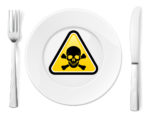 Food poisoning is usually caused by eating food or drink which is contaminated with a pathogen. A pathogen is any harmful microorganism which causes disease. Consequently, this includes bacteria, viruses, fungi and protozoa. Symptoms can develop within hours after eating the contaminated food, but some cases can take days or even weeks.
Food poisoning is usually caused by eating food or drink which is contaminated with a pathogen. A pathogen is any harmful microorganism which causes disease. Consequently, this includes bacteria, viruses, fungi and protozoa. Symptoms can develop within hours after eating the contaminated food, but some cases can take days or even weeks.
Poisons from bacteria already in the food can cause food poisoning. The salmonella or E. coli groups of bacteria are common causes and are found mainly in meat. The Staphylococcus group of bacteria can also cause poisoning within two to six hours of ingesting.
Signs and Symptoms of Food Poisoning
- Nausea
- Vomiting
- Cramping abdominal pains
- Diarrhoea – possibly bloodstained
- A headache or fever
- Signs of shock
- Impaired consciousness.
Problems and Treatment
One serious problem with food poisoning is dehydration. The cause of this is that body fluids are lost and not replaced quickly enough. This is especially serious for the young and old, or people in hot climates. In serious cases, this has to be treated in hospital. Some serious cases can cause sepsis. If you suspect sepsis, get medical treatment as soon as possible.
Treatment is to encourage the patient to rest, as well as giving them plenty of fluids. The use of re-hydration powders mixed with water can also help. You may need to seek medical assistance if needed and sometimes food poisoning will result in hospitalisation. Finally, if someone has had food poisoning, you also need to ensure that no one else is affected.
The patient may be able to identify the cause of the problem. An example could be that they noticed a burger they ate for dinner the night before tasted a bit odd. In some cases, you would need to report it to the authorities or employers. Situations like this happen if the food or drink ingested was from a restaurant or food chain.
For more information on training courses, visit our “Courses” page which also includes our First Responder and First Person on Scene (FPOS) Courses.

